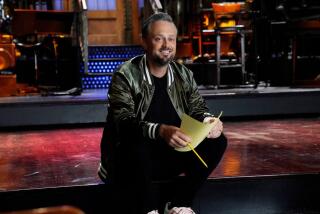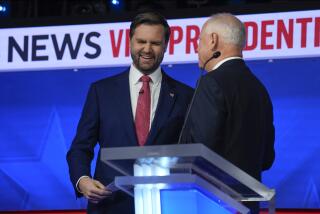THE PRESIDENTIAL DEBATES: ROUND TWO : Donahue-Style Meeting for Would-Be Leaders : Debate: The first-time format has candidates pacing about and gives moderator and audience a disconcerting power.
- Share via
RICHMOND, Va. — It was perhaps inevitable, in this odd election year, that George Bush, Bill Clinton and Ross Perot would at last meet knee-to-knee on a set modeled after an afternoon talk show.
There they were, the men who would be President, perched on high-backed stools while hosts and hostesses ran around soliciting questions from a group of 209 voters assembled by pollsters, but looking for all purposes like a studio audience.
It was, in fact, an audience within an audience, a small group who queried and pressured the leaders-to-be under bright television lights from the floor of a basketball arena as hundreds of others gawked down from the sparsely filled recesses of the half-darkened bleachers.
With tens of millions more Americans watching on their own television screens, those Donahue-style atmospherics added to this year’s second presidential debate the surreal overtones of the kind of drama in which it can be hard to distinguish the real from the make-believe.
Ross Perot even used his folksy closing statement in part to promote the next step in a high-cost campaign he is waging almost entirely by television. “I wish you well,” he said. “I’ll see you tomorrow night on NBC: 10:30 to 11:00 (p.m.) Eastern.”
With the debate format bringing a new democratic lilt to a usually staid presidential campaign, Carole Simpson, the ABC television correspondent who served as its moderator, assured participants from the outset that they were “making history now, and it’s pretty exciting.”
But the oddly contrived nature of the event was more apparent in Simpson’s words to the audience before the cameras began to roll. “Loosen up!” she urged, the moderator playing warm-up woman. “Loosen up!”
Even the candidates’ wives were forced all but offstage at an event designed to thrust ordinary Americans into prominence. The wives entered without announcement and were seated on small risers, each equipped with a television monitor to watch her husband at work.
The talk-show aspects of the exchange were magnified by the peculiar candidate choreography made necessary by the awkward stools--the kind seen only on talk-show sets.
As if never comfortable, the candidates variously sat down, paced and even leaned, using the stools as props to show their eagerness and impatience to talk. For Perot, however, the stools posed a particular problem: The Texan spent much of the debate half-seated, stretching like a young child determined to make his legs reach the floor.
Like debates held during the Democratic primary season, the audience-participation format of the exchange provided a reminder of the high-minded earnestness of Americans eager to hear candidates talk about substantive issues.
But it also empowered voters and moderator in ways that were strangely disconcerting, just 19 days before the election, at an event in which interruptions by non-candidates are usually few. As Bush began to answer a question about how he had personally been affected by hard times, his citizen-interrogator interrupted to demand: “How?”
And when Bush apologized for one long answer by noting that “I get wound up!” Simpson scolded back: “Yes, you do.”
Although the format had never before been a part of the presidential debates, it was no longer new to the candidates at the end of an election year that has elevated the talk show to extraordinary political prominence.
This has been a year, after all, in which Bill Clinton twice squared off with Phil Donahue himself to talk about his marriage, his military draft record and his participation in anti-Vietnam War protests. It was on CNN’s “Larry King Live” show that Ross Perot first hinted about his prospective candidacy and ultimately leaped into the race.
Even George Bush, who for months rued “these crazy talk shows,” has become a veteran of the genre. He appeared on King’s show twice this month, even fielding questions from a call-in audience.
All three candidates showed their expertise as they strode around a temporary stage built atop a basketball floor and under the University of Richmond Spiders’ scoreboard.
The candidates had begun their role-playing from the moment they arrived in this Virginia capital to temporarily set aside their own campaign scripts and join together in 90 minutes of political theater.
Bush, as President, descended by helicopter, flying the 100 miles southward from the White House to Richmond aboard the chopper that only he is permitted to claim as Marine One.
Clinton, as the confident challenger, rolled in by bus, rumbling down the highway from nearby Williamsburg, where he had holed up in virtual silence to protect his voice and avoid injuryto his lead in the polls.
And Perot, as Texas maverick, had flown in by private jet, accompanied by neither reporters nor handlers, seemingly confident that he could steal the show by force of personality alone.
Even their last-minute preparations were true to form. Bush and Clinton both jogged, hopeful that exercise might clear over-rehearsed heads. Perot, still in Texas, got a haircut. He said he gets his best ideas in the barber’s chair.
But the candidates and their aides were clearly entering a new element as they descended into the oddness of a debate framed not by reporters or moderator but by ordinary Americans whose zeal for participation was sometimes marred by vague confusion about the issues--such as when one questioner seemed to confuse the national debt with the sluggish economy.
In the Bush campaign’s senior staff quarters, aides in their 30s and 40s watched the modern-style debate with relish, then quickly rushed out of the room to offer their interpretation of the events. They left behind a dazed Brent Scowcroft, Bush’s national security adviser, who, one aide said, “seemed to find all of this just a bit too much.”
More to Read
Get the L.A. Times Politics newsletter
Deeply reported insights into legislation, politics and policy from Sacramento, Washington and beyond. In your inbox twice per week.
You may occasionally receive promotional content from the Los Angeles Times.










